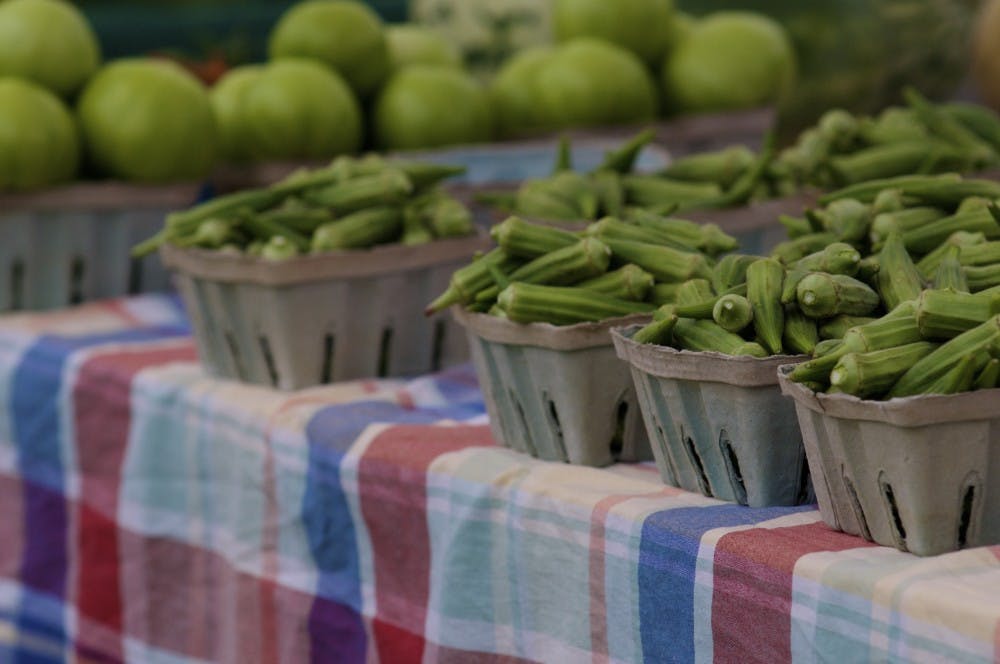Sweat dripping down faces as shoppers make the short walk from their cars to the store where the wind from the cool air condition- ing hits them, almost pushing them back was a common sight this summer. Alabama aver- aged low to mid-90-degree weather, some- times venturing into triple digits, throughout the summer.
The state ranked fourth in Thrillest’s ranking of the most miserable summers because of high temperatures.
For some, the summer heat brings the opportunity to go outside and enjoy the weather. For agriculturalists, the intense heat paired with spotty rain patterns has caused significant problems with certain crops, which have been harmful to Alabama’s agronomy.
Charlie Adams is the leading farmer and face for My Secret Garden, a fruit and vegetable store in Notasulga, Alabama. Adams and others have grown produce for the better part of a decade. His produce is sold and used in many popular restaurants in Auburn.
“Peppers love the heat because they hate wet feet,” Adams said. “Root crops are mainly unaffected as long as the water is constantly being fed. Tomatoes will boil inside their skin. Some even go to mush in your hand.”
In fact, the heat has been so intense that many of his pecan trees have begun to drop their fruit. The normal time of harvest for pecan trees is October and November.
Although he experienced losses to his tomatoes and pecans, Adams found his okra and filet beans handled the heat well. He said he had minimal problems with them this season.
Another local farm, Hornsby Farms, had to implement creative thinking to ensure the best outcome for their crops.
The farm produces a treasure trove of Southern delicacies that have been grown in the Au- burn area for generations. Josh Hornsby, owner of Hornsby Farms, said the quality in his crops stems from the appreciation that comes from his family farm.
Hornsby Farms boasts a well-established plasticulture and drip tape irrigation system. Growing with systems like these allow Horns- by’s best-seller, okra, to flourish. Okra also tends to flourish in hotter seasons, Hornsby said.
He did face some challenges this summer. A large part of his crop dried out, with many crops being damaged beyond repair because of the irregular rain schedule. Many of his peas and cucurbits, such as squash and cucumber, struggled significantly throughout the scorching summer months.
Restaurants like Acre, a farm-to-table restaurant, rely on crops from their on-site gar- dens and orchards and local farmers like Adams and Hornsby to produce meals everyday. Brett Sakaguchi, the executive sous chef and garden keeper at Acre, grows various fruits and vegetables that complement the season.
Proper water use was a major concern to Sakaguchi this summer. Water, or lack thereof, is one of the main factors that determines whether a plant grows or not.
Since Acre lacks any form of irrigation, excess watering can drive up monthly water payments and destroy crops.
Temperatures this summer can easily cause heat-related illnesses and even heat stroke. Both plants and animals can suffer from these, and both require proper hydration and nourishment, which factor into the survival of both the plants and their growers.
There are many solutions that can cut down on the negative effects the heat can have. Adams advises using shade cloths along herb beds and tunnels.
“The topsoil forms a sandy crust when baked in the sun which would need breaking up be- fore any planting could be done,” Adams said. “Cutting low-lying branches also improves air circulation under the plant.”
Soaring temperatures also bring along or exacerbate a number of problems, such as insect and fungus development.
Hornsby said he experienced more insect activity this summer than he ever has before. The main culprit of his crop damage was a severe epidemic of squash bug.
Do you like this story? The Plainsman doesn't accept money from tuition or student fees, and we don't charge a subscription fee. But you can donate to support The Plainsman.





